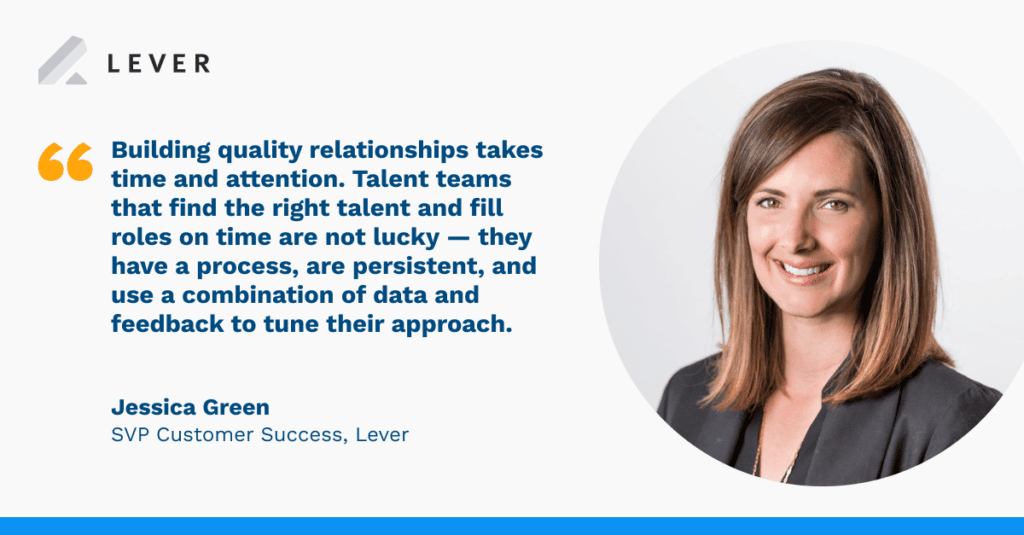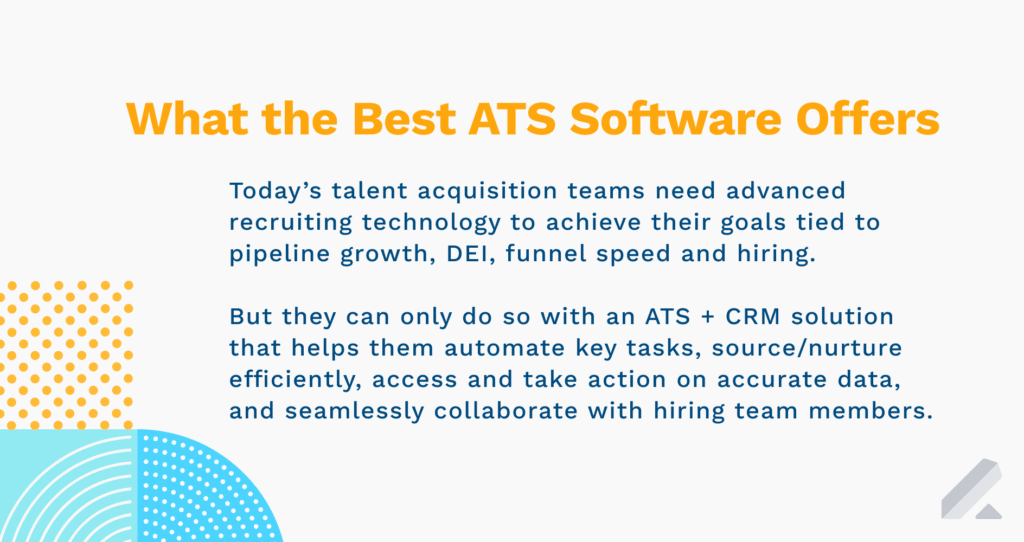No two businesses execute the exact same recruitment strategies to attract top talent.
Sure, many abide by common best practices for sourcing and nurturing. For instance, they send personalized emails to passive candidates, analyze new-hire quality based on origin, and create an employee referral program to ease the sourcing strain on their recruiting orgs.
But, dig a little deeper into the recruiting approaches put in place by these companies’ recruiting teams. You’ll see wholly unique tactics and techniques they implement that help them identify and engage ideal candidates.
Execs and HR focus on your company’s long-term hiring strategy and headcount goals.
Meanwhile, you, your TA colleagues, and other hiring team members must implement distinct recruitment strategies that help your team move the needle in terms of pipeline growth and progression and, ultimately, bring onboard new or promote existing high-quality employees.

7 proven recruitment strategies to help your talent team turn qualified candidates into new hires
Analyzing key recruiting metrics — from time to hire to applicant conversion rates — in your applicant tracking system is obviously essential to your recruitment strategies’ success.
More to the point, this in-depth analysis can help you discern which strategies to double-down on and which you should get rid of entirely.
That said, you need to execute a variety of recruiting techniques to learn which ones help you make progress with your recruitment goals and which don’t before you need to focus on ongoing evaluation of your talent acquisition approach at large.
With that in mind, here are seven helpful recruitment strategies you can carry out in the days, weeks, and months ahead to get more high-quality candidates into your talent pool your recruiters and hiring managers can co-engage for open and upcoming roles.
1) Address flaws in your recruitment process with a data-backed approach.
As our 2022 Talent Benchmarks Report notes, the era of data-driven recruiting is here. (And it has been for quite a while.) It’s just that some TA orgs are just now adopting and embracing analytics to refine their respective recruitment strategies and better scale hiring.
Some insights related to recruiting processes LeverTRM users assess daily range from how many candidates it takes to hire for roles by team, department, and location to what nurture cadence (e.g., how many emails to send in a campaign) leads to the highest response rate.
2) Revisit your candidate personas to find the right potential candidates.
Your marketing team often updates its customer personas. (Likely every quarter or so.)
Thus, it only makes sense for you and your talent team to also refresh your candidate personas from time to time to reach the right people for active and future roles.
The best recruitment strategies — ones that lead to scalable and repeatable hiring — are executed with highly detailed candidate personas top of mind.
Notably, personas that factor in the typical background, knowledge, traits, and skills of high-quality employees at your org who were already hired for the exact or similar roles your TA team needs to fill as well as desired characteristics and expertise.
Ideally, your personas should reside in a living doc that’s updated often and accessible to all recruiters and hiring managers. Why? So each hiring stakeholder can see the latest changes made and offer recommendations on how to “freshen up” particular personas.

3) Modify your employer branding with HR to better appeal to job seekers.
Leading TA teams work with HR to enhance their employer branding so public-facing promotion for roles and of the business at large best resonate with potential applicants.
More specifically, these two teams work in tandem to improve how they:
- Promote the company culture in job descriptions and on your career pages
- Make sure all your job postings feature inclusive, non-gendered language
- Let prospective hires know about the diverse makeup of your business
- Share how your company is focused on mental and emotional wellness
- Generate significant interest among high-quality active and passive talent
Diversity, equity, and inclusion and wellness are two focus areas job seekers now prioritize in their job searches, Lever SVP Customer Success Jessica Green wrote for BenefitsPRO.
Providing info about your company’s DEI initiatives and efforts to provide mental health resources to workers can simultaneously bolster your hiring efforts and employer brand.
4) Implement a new (or enhance your existing) employee referral program.
Not all recruitment strategies should entail your talent team sourcing all candidates.
You should also ensure an employee referral program — one that financially incentivizes your workforce to source for you — is created (or, if already in place, better promoted to your staff) so you can tap into another viable avenue to strengthen your talent pool.
Share sample cold outreach with your employees to make it easy for them to send referral emails to individuals in their networks. They simply need to tailor the messaging to a given role to get their connections to apply (or, at the very least, want to learn more about the business).

5) Assess your interview process top to bottom to ensure it’s well-constructed.
Lever’s talent team is no different than many others today. We continually revamp our own interview processes to provide a world-class experience to each person we speak with.
“We analyze conversion metrics for each stage to tighten up on our interview timeline and continually enhance the candidate experience,” Lever Sr. Recruiter Ash Mullan shared in our latest Talent Benchmarks Report.
(One that includes interview-related insights, among many others, regarding recruiting teams’ use of and ROI with our complete TA suite to better convert top talent.)
Aside from analyzing data associated with interview length and bottlenecks, also ensure your TA team abides by the structured interview framework and use the ideal video interview tech to chat with prospects so you provide a consistently stellar CX to each candidate.
6) Determine how to better appeal to passive candidates in your talent pool.
When application totals are low, it’s time to turn to one of your go-to recruitment strategies:
Resurfacing passive candidates in your talent database and adding the most pertinent prospects (i.e., ones whose experience and expertise align with positions you’re trying to fill) to personalized nurtures.
As we’ve explained, many “passives” actually are willing to at least listen to recruiters who reach out regarding new career opportunities. You just need to ensure your individualized messaging to them for said roles entices them to want to hop on a call to learn more.
7) Replace (or better utilize) recruitment tools in your TA technology stack.
If your best-of-breed TA tech stack is like those of other talent teams, it features an array of useful recruiting tools that empower your recruiters to work smarter instead of harder.
Do they make the most of these recruitment resources, though?
It’s worth evaluating whether your TA org has the right tools to better pinpoint top prospects, interact with them via bespoke nurtures, and interview them in a streamlined manner.
Notably, if you have a legacy ATS that lacks advanced capabilities, like automated, rules-based workflows, and actionable insights regarding team and individual-recruiter performance, it’s time to hit the talent acquisition tech marketplace to find a better solution.

Robust candidate relationship management solution required to execute these recruitment strategies
Putting the above, proven recruitment strategies in play for your business is how you can take a big step forward with your talent acquisition efforts. But it’s important to remember:
These distinct strategies all tie into your team’s overall candidate relationship management (CRM) approach (i.e., the modern talent acquisition approach).
Posting more targeted job ads to career-centric social media sites like LinkedIn and altering the criteria for what a quality candidate looks like to ensure you only extend job offers to top talent are what any talent team worth its salt does to improve recruiting ops today.
But, these changes won’t matter if you use a dated ATS to drive your recruiting.
To truly upgrade your recruitment model and streamline your hiring process, you need a CRM-enabling platform that offers not just effective and easy-to-use applicant tracking capabilities, but also solutions that help you build and sustain strong relationships with candidates.
Then, and only then, will the above recruitment strategies (in conjunction with routine analysis of said TA strategies) help your talent team have an outsize impact on your org’s growth.
Download our Talent Relationship Management eBook to discover the role a TRM approach should play in your recruitment strategies and efforts to grow and scale your org.



